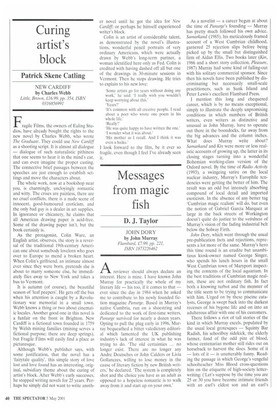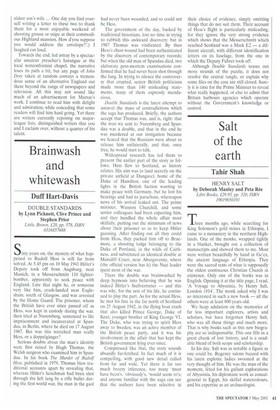Messages from magic fish
D. J. Taylor JOHN DORY by John Murray Flambarcl, 0.99, pp. 221, ISBN 1873226462 reviewer should always declare an interest. Here is mine. I have known John Murray for practically the whole of my literary life — his too, if it comes to that — ever since the day in 1984 when he asked me to contribute to his newly founded fiction magazine Panurge. Based in Murray's native Cumbria, run on a shoestring and dedicated to the work of first-time writers, Panurge survived for nearly a dozen years. Opting to pull the plug early in 1996, Murray bequeathed a bitter valedictory editorial which lamented the UK publishing industry's lack of interest in what he was trying to do. The old certainties ... no longer exist. There are no longer any Andre Deutsches or John Calders or Livia Gollanczes, willing to lose money in the cause of literary fiction by new British writers,' he declared. 'The system is completely shot and the choice you have as an adult as opposed to a hopeless romantic is to walk away from it and start up on your own.'
As a novelist — a career begun at about the time of Panutge's founding — Murray has pretty much followed his own advice. Samarkand (1985), his meticulously framed account of a West Cumbrian childhood, garnered 25 rejection slips before being picked up by the small but distinguished firm of Aidan Ellis. Two books later (Kin, 1986 and a short story collection, Pleasure, 1987) Murray had some kind of falling-out with his solitary commercial sponsor. Since then his novels have been published by discriminating but necessarily small-scale practitioners, such as Sunk Island and Peter Lewis's excellent Flambard Press.
I mention this long and chequered career, which is by no means exceptional, simply to illustrate the deeply unpromising conditions in which numbers of British writers, even writers as distinctive and unusual as John Murray, have to operate out there in the boondocks, far away from the big advances and the column inches. What does Murray write about? Samarkand and Kin were more or less realistic accounts of growing up, the latter in its closing stages turning into a wonderful Bohemian working-class version of the Oxford novel. By the time of Radio Activity (1993), a swingeing satire on the local nuclear industry, Murray's Europhile tendencies were getting the better of him. The result was an odd but intensely absorbing compound of local detail and imported exoticism. In the absence of any better tag 'Cumbrian magic realism' will do, but even the notion of Gabriel Garcia Marquez at large in the back streets of Workington doesn't quite do justice to the weirdness of Murray's vision of the fading industrial belt below the Solway Firth.
John Dory, which went through the usual pre-publication frets and rejections, represents a lot more of the same. Murray's hero this time round is an erudite but unambitious kiosk-owner named George Singer, who spends his lunch hours in the small West Cumbrian town of Maryport inspecting the contents of the local aquarium. In the best traditions of Cumbrian magic realism, these are not ordinary fish. In fact both a knowing turbot and the monster of the title seem to be trying to communicate with him. Urged on by these piscine catalysts, George is swept back into the darkest recesses of his bygone life and on into an adulterous affair with one of his customers.
There follows a riot of tall stories of the kind in which Murray excels, populated by the usual local grotesques — Squinty Bar Radish, his schoolboy sidekick, the elderly farmer, fond of the odd pint of blood, whose centenarian mother still rides out on horseback to harvest the sloes. Some of it — lots of it — is unutterably funny. Reading the passage in which George's vengeful schoolteacher Miss Blood cross-questions him on the etiquette of high-society letterwriting: ('Let's suppose by the time you are 25 or 30 you have become intimate friends with an earl's eldest son and an earl's eldest son's wife ... One day you find yourself writing a letter to these two to thank them for a most enjoyable weekend of shooting grouse or snipe at their commodious Highland mansion, How d'you suppose you would address the envelope?'.) I laughed out loud.
Towards the end, led astray by a spectacular amateur preacher's harangue at the local nonconformist chapel, the narrative loses its path a bit, but any page of John Dory taken at random conveys a tremendous sense of an alternative England out there beyond the range of newspapers and television. All this may not sound like much of an advertisement for Murray's work. I continue to read him with delight and admiration, while conceding that some readers will find him hard going. Yet there are writers currently reposing on majorleague lists, distinguished writers that you and I exclaim over, without a quarter of his talent.











































































 Previous page
Previous page